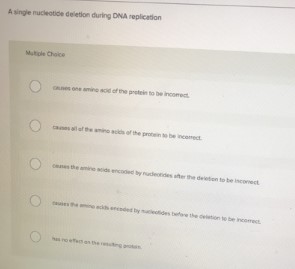QQuestionAnatomy and Physiology
QuestionAnatomy and Physiology
# A single nucleotide deletion during DNA replication
## Multiple Choice
Obsess one amino acid of the protein to be incorrect.
Ossess all of the amino acids of the protein to be incorrect.
Ossess the amino acids encoded by nucleotides after the deletion to be incorrect.
Ossess the amino acids encoded by nucleotides before the deletion to be incorrect.
Yes no effect on the resulting protein.
Attachments

6 months agoReport content
Answer
Full Solution Locked
Sign in to view the complete step-by-step solution and unlock all study resources.
Step 1: Understand the problem
We are considering the effects of a single nucleotide deletion during DNA replication on the resulting protein. The nucleotide deletion will cause a frameshift, leading to changes in the amino acid sequence.
Step 2: Analyze the options
A) Obsess one amino acid of the protein to be incorrect: This is possible, as the deletion of a nucleotide will change the codon and might affect the corresponding amino acid. B) Obsess all of the amino acids of the protein to be incorrect: This is unlikely, as only the amino acids encoded after the deletion will be affected. C) Obsess the amino acids encoded by nucleotides after the deletion to be incorrect: This is correct. The deletion will cause a frameshift, changing the codons and thus the corresponding amino acids after the deletion point. D) Obsess the amino acids encoded by nucleotides before the deletion to be incorrect: This is incorrect, as the deletion only affects the codons after the deletion point. E) No effect on the resulting protein: This is incorrect, as a single nucleotide deletion will cause a frameshift and change the amino acid sequence.
Final Answer
The correct answer is C. A single nucleotide deletion during DNA replication will cause a frameshift, leading to changes in the amino acid sequence of the protein. Specifically, the amino acids encoded by nucleotides after the deletion will be incorrect.
Need Help with Homework?
Stuck on a difficult problem? We've got you covered:
- Post your question or upload an image
- Get instant step-by-step solutions
- Learn from our AI and community of students